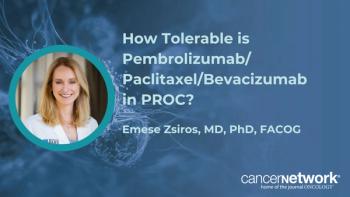
Oncology NEWS International
- Oncology NEWS International Vol 9 No 8
- Volume 9
- Issue 8
Taxol 3-Hour Infusion Approved for Advanced Ovarian Cancer
PRINCETON, NJ-Bristol-Myers Squibb Company announced in a press release that the FDA has approved a novel, shorter administration regimen for Taxol (paclitaxel) injection for the treatment of advanced ovarian cancer. The new 3-hour regimen offers patients the advantage of administration in an outpatient setting.
PRINCETON, NJBristol-Myers Squibb Company announced in a press release that the FDA has approved a novel, shorter administration regimen for Taxol (paclitaxel) injection for the treatment of advanced ovarian cancer. The new 3-hour regimen offers patients the advantage of administration in an outpatient setting.
In the pivotal trial for the new dosing regimen, conducted by a Canadian-European consortium of cooperative groups, 680 women with stage IIb to IV ovarian cancer were randomized to receive Taxol at a dose of 175 mg/m² in combination with cisplatin (Platinol) (75 mg/m²) as a 3-hour regimen every 3 weeks or the standard therapy (cyclophosphamide 750 mg/m² followed by cisplatin 75 mg/m²).
Women in the Taxol arm experienced significantly improved overall survival, compared with women in the cyclophosphamide arm (35.6 months vs 25.9 months). Progression-free survival was significantly longer for the Taxol patients (15.3 months vs 11.5 months). Further, a large number of patients in the cyclophosphamide arm with progressive disease were subsequently treated with a Taxol-based therapy.
This study also confirmed the safety of the 3-hour Taxol regimen and showed that the combination resulted in a lower incidence of severe neutropenia (33% vs 43% for cyclophosphamide/cisplatin). However, the incidence of myalgia/arthralgia and severe neurotoxicity was greater in the Taxol/cisplatin arm.
Taxol is also approved for use in advanced ovarian cancer at 135 mg/m² over a 24-hour infusion period given in combination with cisplatin (75 mg/m²) every 3 weeks.
Articles in this issue
over 25 years ago
Scientists Identify Gene Mutations in Multiple Myelomaover 25 years ago
Single-Agent Herceptin Active in Metastatic Breast Cancerover 25 years ago
Brain Metastases Respond to Paclitaxel, Carboplatin, and Brain RTNewsletter
Stay up to date on recent advances in the multidisciplinary approach to cancer.
Related Content













































